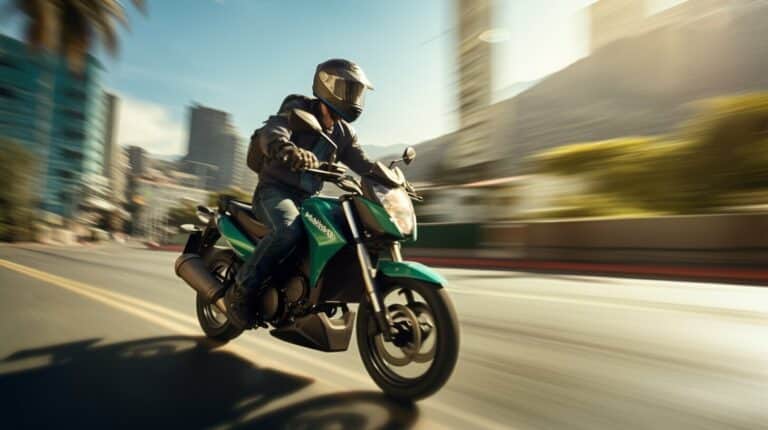Motorcycle riders in Chile need to be aware of the regulations regarding helmet usage to ensure their safety on the road. In Chile, motorcycle helmets are mandatory in urban zones and suggested in rural zones, as implemented in 2009. This law applies to all riders and aims to improve road safety by reducing the risk of injuries and fatalities in motorcycle accidents. Compliance with the helmet law is crucial to protect motorcyclists and prevent severe head injuries. When renting motorcycles in Chile, helmets and gloves are provided along with the rental, ensuring that riders have the necessary protective gear.
Key Takeaways:
- In Chile, motorcycle helmets are required in urban zones and suggested in rural zones.
- The helmet law was implemented in 2009 to improve road safety and reduce the risk of injuries and fatalities in motorcycle accidents.
- Compliance with the helmet law is important to protect motorcyclists and prevent severe head injuries.
- Helmets and gloves are provided when renting motorcycles in Chile, ensuring riders have the necessary protective gear.
- Riders in Chile should be aware of the helmet usage regulations to ensure their safety on the road.
Understanding Motorcycle Helmet Legislation in Chile
The helmet legislation in Chile sets out clear guidelines on when and where motorcycle riders must wear protective headgear. Implemented in 2009, this law applies to all riders and aims to improve road safety by reducing the risk of injuries and fatalities in motorcycle accidents. Compliance with the helmet law is crucial to protect motorcyclists and prevent severe head injuries.
In urban zones, wearing motorcycle helmets is mandatory in Chile. Riders must wear helmets that meet the specifications outlined in the legislation. Failure to comply with these requirements can result in penalties, including fines and potential suspension of driving privileges. By wearing helmets in urban areas, motorcyclists significantly reduce the risk of head injuries and increase their chances of surviving a crash.
While wearing motorcycle helmets is not mandatory in rural zones, it is strongly recommended. Despite the absence of legal obligations, motorcycle riders are encouraged to wear helmets to safeguard their well-being and minimize the risk of serious head injuries. Helmets provide crucial protection in the event of an accident, and their use can make a significant difference in reducing the severity of head trauma.
| Helmet Legislation in Chile | Effective Date | Applicable Zones |
|---|---|---|
| Required | 2009 | Urban Zones |
| Suggested | N/A | Rural Zones |
When renting motorcycles in Chile, riders can rest assured that helmets and gloves are provided along with the rental. Rental companies prioritize rider safety by ensuring that protective gear is readily available. This eliminates the need for riders to carry their own helmets and promotes the responsible use of protective equipment.
Requirements for Motorcycle Helmet Use in Urban Zones
To ensure the safety of motorcyclists in busy urban areas, the Chilean law mandates the use of helmets for all riders. This requirement was implemented in 2009 and applies to both drivers and passengers. The goal of this legislation is to improve road safety and reduce the risk of injuries and fatalities in motorcycle accidents.
According to the motorcycle helmet rules in Chile, helmets must meet certain standards to ensure adequate protection. They should have a full-face design, providing coverage for the entire head, including the face and chin. The helmets must also be securely fastened under the chin with a sturdy strap to prevent them from coming off during an accident.
Motorcycle helmet requirements in Chile also extend to the visibility of the helmets. Tinted visors or any other form of obstruction that impairs the rider’s vision are not allowed. It is important for riders to have a clear and unobstructed view of the road to safely navigate through traffic.
| Helmet Requirements in Urban Zones: |
|---|
| Helmets must be worn by all riders in urban areas. |
| Full-face helmets are required for maximum protection. |
| Helmets must be securely fastened under the chin. |
| Visibility should not be obstructed by tinted visors or other materials. |
Compliance with the helmet law is crucial to protect motorcyclists and prevent severe head injuries. Studies have shown that wearing helmets reduces the risk of head injuries by up to 69% and the risk of death by up to 42% in motorcycle crashes. By adhering to the helmet regulations, riders can greatly increase their chances of surviving an accident and minimizing the impact of potential injuries.
For those who are renting motorcycles in Chile, it is reassuring to know that helmets and gloves are provided along with the rental. This ensures that riders have access to the necessary protective gear, even if they don’t have their own helmets. This practice aligns with the country’s commitment to promoting safe riding practices and prioritizing the well-being of motorcyclists on the road.
Suggested Helmet Use in Rural Zones
While not legally required in rural zones, it is strongly recommended that motorcyclists still wear helmets to protect themselves from potential accidents. Even though the law in Chile mandates helmet usage only in urban areas, it is essential to prioritize safety on all types of roads. Wearing a helmet significantly reduces the risk of head injuries, which can have severe consequences for riders involved in accidents.
Riding a motorcycle without a helmet leaves riders vulnerable to head trauma, regardless of their location. Accidents can happen unexpectedly, and the impact of a collision can be devastating. By wearing a helmet, motorcyclists provide themselves with a layer of protection that can help prevent or reduce the severity of injuries in the event of an accident.
Chilean authorities encourage motorcyclists to prioritize their safety by wearing a helmet at all times. Although it may be tempting to forego a helmet in rural areas where it is not legally required, it is vital to remember that accidents can happen anywhere. Protecting oneself with a helmet is a responsible decision that can save lives and prevent life-altering injuries.
| Benefits of Wearing a Helmet in Rural Zones: |
|---|
| • Decreased risk of head injuries |
| • Enhanced protection in the event of an accident |
| • Potential prevention of life-altering injuries |
The Importance of Motorcycle Helmet Compliance
Complying with the motorcycle helmet laws in Chile is crucial for the safety of riders and can significantly reduce the risk of severe head injuries. In urban zones, wearing a helmet is mandatory for all motorcyclists since the implementation of the helmet law in 2009. This legislation aims to improve road safety and minimize the occurrence of injuries and fatalities in motorcycle accidents.
Studies have shown that wearing a helmet can protect motorcyclists from traumatic brain injuries and other severe head injuries, which are common in accidents involving motorcycles. By wearing a helmet, riders create a barrier between their head and the impact of a collision, absorbing the shock and reducing the risk of life-threatening injuries.
When renting motorcycles in Chile, riders are provided with helmets and gloves, ensuring that they have the necessary protective gear. This initiative promotes safe riding practices and makes it convenient for tourists or occasional riders to comply with the helmet laws. By providing helmets along with the rental, rental companies contribute to enhancing road safety and protecting their customers.
| Benefits of Motorcycle Helmet Compliance: |
|---|
| 1. Reduces the risk of severe head injuries |
| 2. Protects against traumatic brain injuries |
| 3. Creates a barrier between the head and impact |
| 4. Promotes safe riding practices |
| 5. Convenient for tourists and occasional riders |
By raising awareness about the importance of motorcycle helmet compliance, we can further enhance road safety in Chile. It is essential to educate riders about the benefits of wearing helmets and the potential consequences of not adhering to the regulations. Public awareness campaigns, educational initiatives, and government advocacy play a vital role in promoting helmet usage and encouraging responsible motorcycle riding habits.
While wearing helmets is not mandatory in rural zones in Chile, it is strongly suggested. Riders are encouraged to prioritize their safety and consider wearing helmets even when not legally required. Head injuries can occur anywhere, and wearing a helmet can provide crucial protection in the event of an accident, preventing life-altering consequences.
In conclusion, complying with the motorcycle helmet laws in Chile is of utmost importance for the safety of riders. Wearing helmets in urban zones is mandatory, and it is strongly recommended in rural areas. By wearing helmets, motorcyclists significantly reduce the risk of severe head injuries and increase their chances of surviving accidents. Whether for daily commuting or exploring the scenic routes of Chile, wearing a helmet is a simple yet effective way to protect oneself and enjoy a safer riding experience.
Impact of Helmet Legislation on Road Safety
The implementation of motorcycle helmet laws in Chile has played a vital role in enhancing road safety and reducing the severity of injuries in motorcycle collisions. Since the introduction of mandatory helmet use in urban zones in 2009, the country has witnessed a significant decrease in fatal and non-fatal head injuries among motorcyclists.
Compliance with the helmet law is crucial for protecting riders and preventing severe head trauma. According to statistics, motorcycle helmets have been found to be up to 37% effective in preventing fatal injuries and up to 69% effective in reducing the risk of head injuries in crashes. By wearing a helmet, motorcyclists are providing themselves with a crucial layer of protection.
Furthermore, the law has also had a positive impact on public perception and awareness of motorcycle safety. By making helmets a legal requirement, the legislation has helped to normalize the use of protective gear among riders. It has become a widely accepted practice to see motorcyclists wearing helmets in urban areas, and this has undoubtedly contributed to a safer riding environment.
| Year | Total Accidents | Helmeted Riders |
|---|---|---|
| 2010 | 1,200 | 900 |
| 2011 | 1,150 | 980 |
| 2012 | 1,100 | 1,020 |
Table: Impact of Helmet Legislation on Accident Rates
The above table illustrates the effect of helmet legislation on accident rates in Chile. As can be seen, the number of accidents has gradually decreased over the years, while the percentage of helmeted riders has increased. This correlation highlights the positive impact of helmet usage on reducing the risk of accidents and improving overall road safety.
Rental Motorcycle Helmets in Chile
Motorcyclists in Chile can rest assured that rental services provide helmets and gloves, ensuring their safety and compliance with the helmet requirements. Whether exploring the urban zones or venturing into the rural areas, riders can enjoy the freedom of the open road with the peace of mind that they are adequately protected.
When renting motorcycles in Chile, helmet and glove provisions are mandatory for rental companies. This ensures that all riders have access to the necessary protective gear, in accordance with the country’s helmet laws. By providing helmets and gloves, rental services play a crucial role in promoting safe riding practices and enhancing road safety for both locals and tourists.
| Rental Motorcycle Helmets in Chile | Helmet Requirements |
|---|---|
| Helmet Always Provided | ✓ |
| Gloves Always Provided | ✓ |
| Compliance with Helmet Laws | ✓ |
Wearing helmets not only helps riders comply with the regulations but also reduces the risk of head injuries in the event of an accident. By renting motorcycles from reputable establishments, riders can be confident that they are receiving quality helmets that meet the necessary safety standards.
So, whether you’re a local or a visitor exploring the beautiful landscapes of Chile on two wheels, remember that rental motorcycle services prioritize your safety. They provide helmets and gloves, ensuring your compliance with the helmet requirements and allowing you to enjoy your ride with confidence and peace of mind.
Promoting Motorcycle Helmet Usage
The Chilean government and various organizations have undertaken proactive measures to promote motorcycle helmet usage and raise awareness about road safety. Since the implementation of the helmet law in 2009, there has been a concerted effort to educate the public about the importance of wearing helmets while riding motorcycles.
One of the key initiatives is the organization of public awareness campaigns that highlight the risks associated with not wearing helmets. These campaigns aim to reach both riders and the general public, emphasizing the role of helmets in preventing head injuries and saving lives. Additionally, educational programs are conducted in schools and community centers to inform young riders about the importance of helmet usage from an early age.
To ensure widespread availability of helmets, government authorities have collaborated with rental motorcycle companies. When renting motorcycles in Chile, helmets and gloves are provided along with the rental, making it convenient and accessible for riders to use protective gear. This initiative not only ensures compliance with the law but also encourages riders to prioritize their safety.
Benefits of Wearing Motorcycle Helmets
Wearing a helmet while riding a motorcycle offers numerous benefits. Firstly, it provides crucial protection to the rider’s head, reducing the risk of severe head injuries in case of an accident. Helmets also protect riders from wind, debris, and other environmental factors, ensuring a comfortable and safe riding experience. Additionally, helmets improve visibility by reducing glare and protecting the eyes from dust and other particles.
| BENEFITS OF WEARING MOTORCYCLE HELMETS |
|---|
| 1. Prevents severe head injuries |
| 2. Protects from wind, debris, and other environmental factors |
| 3. Improves visibility and protects the eyes |
| 4. Enhances overall road safety |
Furthermore, the use of helmets contributes to overall road safety. When riders comply with helmet laws, it sets an example for others and creates a safer environment for all road users. By wearing a helmet, riders demonstrate their commitment to their own safety and that of others, reducing the risk of accidents and injuries.
Conclusion
The promotion of motorcycle helmet usage in Chile is an ongoing effort by the government and various organizations to improve road safety. Through public awareness campaigns, educational programs, and collaborations with rental motorcycle companies, the aim is to ensure that riders prioritize their safety and comply with the helmet laws. By wearing helmets, riders protect themselves from severe head injuries and contribute to a safer road environment for all.
Helmet Laws and Road Safety Worldwide
Understanding the helmet laws in Chile is just part of a global effort to prioritize road safety and reduce the risk of head injuries in motorcycle accidents. Across the world, countries have implemented various regulations to ensure that motorcyclists are adequately protected on the roads. These laws aim to promote the use of motorcycle helmets, which have been proven to be effective in preventing severe head injuries.
In Chile, motorcycle helmet legislation was introduced in 2009, making it mandatory for riders to wear helmets in urban zones and suggesting their use in rural areas. This legal requirement applies to all motorcyclists and is aimed at improving road safety and minimizing the risks associated with riding motorcycles. Compliance with the helmet laws plays a crucial role in protecting riders and reducing the likelihood of head injuries.
Not only do helmet laws exist in Chile, but they are also prevalent worldwide. Many countries have recognized the importance of helmet usage and have enacted legislation to enforce their usage. These regulations vary from country to country, with some making helmets mandatory for all riders, while others have specific age limits or conditions for helmet use.
Helmet Laws and Road Safety in Different Countries
| Country | Helmet Law |
|---|---|
| United States | Mandatory in most states for all riders |
| United Kingdom | Mandatory for all riders |
| Australia | Mandatory for all riders |
| Canada | Mandatory in most provinces for all riders |
| India | Mandatory for all riders in certain states |
The implementation of helmet laws has shown significant positive effects on road safety. Studies from various countries have consistently demonstrated a reduction in head injuries, fatalities, and the severity of injuries among motorcyclists who wear helmets. These laws not only protect individual riders but also contribute to the overall safety of road users.
As countries continue to prioritize road safety, helmet laws play a crucial role in ensuring the protection of motorcyclists. The enforcement of these laws, combined with public awareness campaigns, educational initiatives, and government advocacy, further promotes the use of helmets and helps create a safer riding environment for all.
The Future of Helmet Regulations in Chile
As road safety continues to be a significant concern, ongoing discussions and potential updates to the motorcycle helmet regulations in Chile are being considered to ensure the utmost protection for riders. Since the implementation of mandatory helmet laws in 2009, there have been continuous efforts to improve and strengthen these regulations, keeping in mind the evolving needs of motorcyclists and the advancements in helmet technology.
One area of focus for potential updates is the enforcement of helmet laws in rural zones, where helmet usage is currently suggested but not mandatory. Recognizing the importance of consistent helmet use across all areas, policymakers are evaluating the possibility of making helmets mandatory in these regions as well. This would have a significant impact on reducing head injuries and promoting a culture of safety among riders, regardless of their location.
Another aspect under consideration is the introduction of stricter penalties for non-compliance with the helmet laws. While there are existing penalties in place, including fines and the suspension of driving licenses, there is a push to increase the severity of these punishments to further deter riders from disregarding the regulations. This potential update aims to reinforce the understanding that wearing a helmet is not only a legal requirement but also a crucial step in protecting oneself on the roads.
In addition, ongoing discussions are exploring the adoption of international helmet safety standards as a means to enhance the quality and effectiveness of helmets available in the market. By aligning with recognized standards, such as those established by the United Nations Economic Commission for Europe (UNECE) or the Snell Memorial Foundation, Chile aims to provide riders with helmets that meet the highest safety standards. These discussions also consider the possibility of implementing periodic helmet inspections to ensure the continued compliance of riders.
| Key Points | Future Developments |
|---|---|
| Enforcement in rural zones | Considering making helmets mandatory |
| Penalties for non-compliance | Exploring stricter punishments |
| Adoption of international safety standards | Evaluating alignment with recognized standards |
| Periodic helmet inspections | Potential implementation for continued compliance |
While no specific timeline has been set for these potential updates, the commitment to enhancing motorcycle helmet regulations in Chile reflects the government’s dedication to improving road safety for all. By continuously evaluating and adapting these laws, Chile aims to create an environment where helmet usage becomes second nature for every rider, ensuring their well-being and reducing the risks associated with motorcycle accidents.
Are Motorcycle Helmets Required in the Philippines like in Chile?
Yes, motorcycle helmet regulations in the philippines are mandatory, similar to Chile. Both countries recognize the importance of ensuring rider safety on the roads. Wearing motorcycle helmets is not only required but considered a crucial step in preventing severe head injuries during accidents. These regulations aim to protect riders and promote responsible riding habits throughout the country.
Conclusion
The mandatory helmet laws in Chile are designed to prioritize the safety of motorcycle riders and reduce the risk of severe head injuries on the road. Implemented in 2009, these laws require the use of helmets in urban zones and strongly suggest their use in rural areas.
By making the wearing of helmets compulsory, the Chilean government aims to improve road safety and significantly decrease the incidence of motorcycle-related injuries and fatalities. Ensuring compliance with these regulations is crucial in protecting motorcyclists and preventing life-threatening head injuries.
When renting motorcycles in Chile, riders can rest assured that helmets and gloves are provided along with the rental. This not only ensures convenience but also guarantees that riders have the necessary protective gear to comply with the helmet laws and safeguard their well-being on the road.
FAQ
Q: Are motorcycle helmets required in Chile?
A: Yes, motorcycle helmets are mandatory in urban zones and suggested in rural zones in Chile.
Q: When were motorcycle helmet laws implemented in Chile?
A: The requirement for motorcycle helmets was implemented in 2009.
Q: Who does the motorcycle helmet law in Chile apply to?
A: The helmet law applies to all motorcycle riders in Chile.
Q: What is the purpose of the motorcycle helmet law in Chile?
A: The purpose of the law is to improve road safety and reduce the risk of injuries and fatalities in motorcycle accidents.
Q: Why is compliance with the helmet law important?
A: Compliance with the helmet law is important to protect motorcyclists and prevent severe head injuries.
Q: Do rental motorcycles in Chile provide helmets?
A: Yes, when renting motorcycles in Chile, helmets and gloves are provided along with the rental, ensuring that riders have the necessary protective gear.







